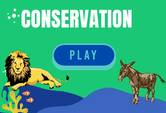Game Quiz On Conservation Online
This page features a Game Quiz On Conservation Online. It is an exercise for students studying science in 3rd, 4th, 5th, 6th to 8th grades. Students learn about the reasons why it is important for humans to protect the environment through conservation efforts. The Earth is losing a lot of its ecosystems due to the impact of human factors like agriculture and industralization. Without conservation efforts, the speed at which ecosystems are being lost is great. This game is for classrooms and homeschool. It is free and should be shared on any school platform if need be.

What Is Conservation and Why Is It Important?
In this article, we'll look at what conservation means, why it's important, and how it can help wildlife. This article will also discuss the Environmental Conservation Act and why it's so important. After reading this article, you'll be better equipped to answer these questions. And, hopefully, this article will help you make a decision about conservation in your community. There are 4 basic types of conservation. We'll discuss each one in more detail below.
Conservation wildlife
While most of us have heard of conservation when it comes to resources, it can be difficult to understand the concept of wildlife conservation. Conservation is defined as "wise use" of wildlife and its habitats. Biologists manage wildlife populations and habitats to protect threatened, native, and fish species. It recognizes that wildlife is a public trust, and that our actions can help ensure that it will continue to thrive. There are many reasons to support conservation efforts.
A recent study shows that one-third of the wildlife in the United States is threatened with extinction. Approximately 150 species have been declared extinct in the U.S., and nearly 500 others haven't been seen in decades. This crisis has led state fish and wildlife agencies to develop State Wildlife Action Plans that identify threatened and endangered species in the state and identify specific conservation efforts that can help these species recover. So far, these plans have identified over 12,000 species in need of proactive conservation efforts.
What are the 4 types of environmental conservation
There are four types of conservation centered around: environmental conservation, animal conservation, marine conservation and human conservation . Each plays a vital role in maintaining a healthy planet. All four of these types need help from us. However, there is a huge difference between them. The purpose of these different types of conservation is different. The focus of each type varies. In general, they aim to conserve land, water, and wildlife.
Environmental conservation aims to maintain the natural world as much as possible. Its goal is to protect the environment, which is under threat from human activities such as the production of plastic, deforestation, and climate change. Scientists warn that if we do not act, the number of natural disasters will increase. Without action, natural disasters will become more frequent and destructive, causing collapse of ecosystems, food scarcity, and global displacement of people.
Why is environmental conservation important?
In recent years, governments have committed billions of dollars to support environmental conservation. Increasingly, they are taking action on climate change and other pressing environmental issues. The United Nations has declared the decade from now until 2030 as a Decade on Restoration, which calls for a global effort to heal the Earth. Some companies are even transforming their supply chains to protect more land. Indigenous people have long advocated for conservation, and it is a growing global movement.
Several major issues differ between developed and developing countries. Environmental problems are more serious in developing countries, while more developed nations are faced with more pressing concerns. The developing world, for example, faces air pollution and water contamination from industrial production. Developed countries continue to face legacy contamination from historic industrial practices and emerging concerns about chemicals. In both developed and developing nations, pollution has grown exponentially. By 2030, the number of global environmental problems is projected to exceed the current total of all natural resources.
Environmental Conservation Act
The Environmental Conservation Act (ECA) provides a framework for sustainable development by ensuring that natural resources are conserved. It has several sections that address different aspects of conservation and the protection and enrichment of the quality of the environment. For example, Part III addresses the protection of specific ecological processes, biotic diversity and indigenous wildlife. The Act also establishes special nature reserves in State-owned areas and territorial waters. These areas are closed to all but scientists and conservationists. Further, the Environmental Conservation Act provides provisions for waste management. Part V addresses land use, water use and agricultural practices.
The ECA is the first act in South Africa to attempt to define the term "environment". It defines the term as the "aggregate of all objects and conditions that surround and influence a human being and his or her life". However, such a broad definition of the term might compromise the effort for conservation and the development of an effective environmental law. Thus, the ECA should be revised to provide a more subject-oriented definition. There is a need to simplify the environmental legislation to ensure that the protection of our environment remains a top priority.
